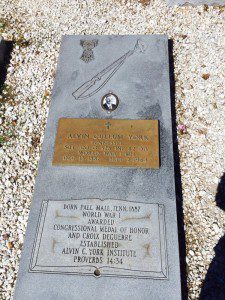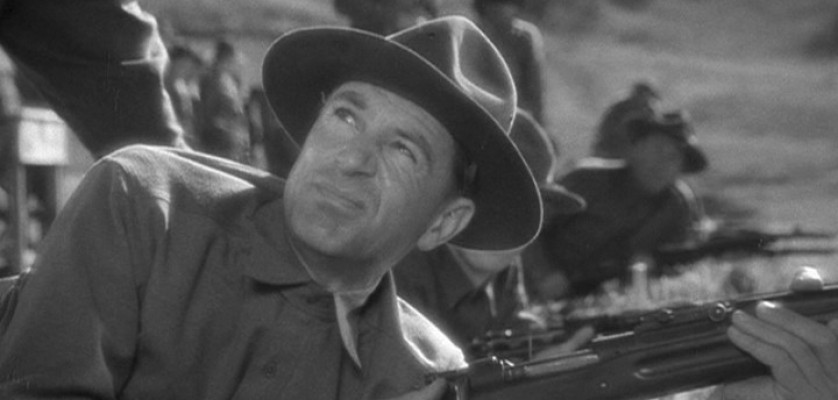Spending your life around the military and educating yourself about the sacrifices, heroics, and commitments, you realize it’s pretty easy to look at all branches of the military and find many individuals who have gone above and beyond their oath and served in a manner that made them legendary.
With all the men and women who have served in the United States military in every war and conflict, it seems like trying to find that one soldier who transcends them all would be difficult.
Funny, while researching a different subject matter, a story I thought I knew very well came to light and the further I went down that trail, the more I learned about a soldier who was pretty famous, but his back story and life overall made me realize that his military service added up to considering him the greatest soldier of all time.

Few would have guessed at his humble birth in a one-room cabin on Dec. 13, 1887, that Alvin Cullum York would become the standard of excellence for a military man.
Born in Pall Mall, Tenn., Alvin York was the third of 11 children. Raised on a small farm, the son of a poor blacksmith left school after the third grade, admitted that in his youth he was “wild and bad for five or six years.”
He recalled: “I used to drink a lot of moonshine. I used to gamble my wages away week after week. I used to stay out late at night. I had a powerful lot of fist fights … I knew all the time I was going along this kind of life, deep down in my heart, that I was doing things that were not right.”
Alvin told of coming home one night “after being very drunk and fighting.” His mother, who had continually pleaded with her son to change his ways, asked him a simple question: “Alvin, when are you going to be a man like your father and your grandfathers?”
York recalled, “I promised my mother that night I would never drink again; I would never smoke or chew again; I would never gamble again; I would never cuss or fight again. And I have never drunk any whiskey, I have never touched cards, I have never smoked or chewed, and I have never fought or rough-housed since that night.”
When World War I came around, those that fought it called it the “war to end all wars” as it was as brutal as any war could have ever been. The mechanized weapons and the trench-style warfare produced killing fields that could be called the worst of all time.
When the draft came for Alvin, he had become a devout Christian and as killing went against his teaching, he fought with himself as to which leader he should answer to: His God or his country.
In June 1917, at age 29, Alvin York received his notice to register for the draft. On the same day York started a diary, which he kept faithfully throughout the war.
Being called to take up arms in war caused a conflict within York. His ancestors had served in war since the American Revolution and York felt that “my ancestors would want me to do whatever my country demanded of me.” Yet, at the same time, York reasoned, “if I went away to war and fought and killed, according to my reading of the Bible, I weren’t a good Christian.”
York decided that God’s law must take precedent over family tradition or the laws of man. When York registered for the draft he wrote simply on the form, “I don’t want to fight.”
He attempted to be exempted by reason that his church forbade its members to kill. But his exemption was denied on the grounds that his church did not expressly prohibit killing during war.
York’s crisis of conscience was not settled until, according to York, “I prayed and prayed. I prayed two whole days and a night out on the mountainside.” Ultimately, York decided that God had given him the go-ahead to “answer the call of my country.”
Alvin arrived in France on May 21, 1918. His unit first saw major action during the Battle of Saint-Mihiel in September 1918. By this time York had been promoted to the rank of corporal and given command of a squad. The drive was a success and the American Army moved on to the Argonne Forest for the last major drive of World War I. It was on Oct. 8, 1918 in the Argonne Forest that Cpl. Alvin York performed the acts of extreme bravery for which he was awarded the Congressional Medal of Honor. When the movie of Sergeant York came out with Gary Cooper playing Alvin, you would think such an event could only been dreamed up by backroom movie makers who were detached from the reality of the battlefield and more interested in selling tickets then dealing in facts. But back in those old black and white days of film, the stories pretty much reflected the reality of what actually happened.
York’s battalion was charged with advancing across a valley and taking the two hills on the far side. The Germans, however, were dug into the hills with machine gun emplacements and had a complete view of the valley. According to York: “It was kind of a triangular shaped valley. So you see we were getting it from the front and both flanks. Well, the first and second waves got about halfway across the valley and then were held up by machine gun fire from the three sides. It was awful. Our losses were very heavy.”

York and the other squad commanders assigned to the left flank of the advance, quickly realized that the hills would be impossible to take from the front without significantly more men. They decided to attempt a sneak attack by advancing around the enemy’s flank and attacking from the rear.
At this point the combined forces of the squads, including York’s, was 17 men. Upon advancing undetected around the enemy’s flank and approaching from the rear, the unit stumbled across the headquarters of the machine gun regiment. The Germans were eating breakfast at the time and were completely surprised by the Americans. Most promptly surrendered, but one German shot at York, who quickly killed the German with one shot. The Americans disarmed and assembled the Germans, but by this time the machine gunners on the hill had been alerted to the Americans’ presence.
According to York: “There were about 30 of them. They were commanding us from a hillside less than 30 yards away. They couldn’t miss. And they didn’t!” The machine guns took out nine men, including an officer, leaving Corporal York in charge. It was at this point that York began to make history. As the initial blast of machine gun fire hit the Americans, York was standing out in the open. York wrote in his diary: “Those machine guns were spitting fire and cutting down the undergrowth all around me something awful … I didn’t have time to dodge behind a tree or dive into the brush, I didn’t even have time to kneel or lie down … As soon as the machine guns opened fire on me, I began to exchange shots with them.”
This is just the beginning of this amazing story and, as I said, his actions so legendary that I will end it here and pick up with the rest of the story in the next issue, as I want to make sure you can judge his actions and see if they would fit your definition of the greatest of all time.
Also, I want to also share the amazing story that began after his military career was over when good times and good deeds ended up costing him dearly and having him end up penniless and in dire straits with the country that awarded him the Medal of Honor.
I can’t wait to share “the rest of the story.” It’s the type of story that will make you think about how conditions, personalities, and a lot of spirituality can define a man or women for all time.
Until next time, Bob out …












